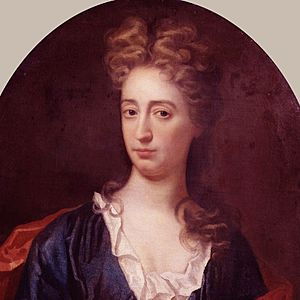Abigail Masham, Baroness Masham facts for kids
Quick facts for kids
The Lady Masham
|
|
|---|---|
 |
|
| Keeper of the Privy Purse | |
| In office 1711–1714 |
|
| Monarch | Anne |
| Preceded by | The Duchess of Marlborough |
| Succeeded by | Caspar Henning |
| Personal details | |
| Born |
Abigail Hill
c. 1670 London, England |
| Died | 6 December 1734 (aged c. 64) High Laver, Essex, England |
| Resting place | High Laver, Essex |
| Spouse | |
| Children | 5 |
| Parents | Francis Hill Elizabeth Jennings |
Abigail Masham, Baroness Masham (born Abigail Hill, around 1670 – December 6, 1734), was an important person at the English royal court. She was a close friend and trusted helper to Queen Anne. Abigail was also a cousin of Sarah, Duchess of Marlborough, who was another very powerful woman at court.
Life at Court
Abigail's Early Years
Abigail Hill was born around 1670 in London, England. Her father, Francis Hill, was a merchant. Her mother, Elizabeth Hill, was the aunt of Sarah Jennings. Sarah later became the Duchess of Marlborough.
Abigail's family faced hard times because her father lost money. This meant Abigail had to work as a servant. Her cousin, Sarah Jennings (who was then Lady Churchill), helped her. Sarah was a Lady of the Bedchamber to Princess Anne.
Sarah Churchill said she had only just found out about Abigail. This was understandable, as their shared grandfather had 22 children. Sarah took Abigail into her home. When Princess Anne became Queen in 1702, Abigail got a job in the Queen's household around 1704.
Becoming the Queen's Favourite
By 1704, Queen Anne was getting tired of Sarah, Duchess of Marlborough. Sarah was often away from court. She also kept telling the Queen what to do about politics. Sarah was a Whig, and Queen Anne was a Tory.
Sarah wanted Queen Anne to choose more Whig ministers. Most Whigs supported the Duke of Marlborough's wars. But the Queen did not want to abandon her Tory friends. She told her chief minister, the Earl of Godolphin, that she and Sarah might never be true friends again.
Soon, Abigail Hill began to take Sarah's place in the Queen's favour. It is not clear if Abigail planned this. It was more likely that Abigail's gentle and friendly nature was a welcome change. Sarah's strong personality had perhaps become too much for the Queen.
Sarah Churchill first realized Abigail's growing influence in 1707. She learned that Abigail had secretly married Samuel Masham. He was a gentleman in the Queen's household. The Queen herself had been at the wedding. Sarah then found out that Abigail had been very close to the Queen for some time. Sarah had not known anything about it.
Abigail was also a cousin of Robert Harley. After Harley was removed from his job in 1708, Abigail helped him. She kept him in touch with the Queen. Harley later became the Earl of Oxford in 1711.
Abigail's power grew even more in 1710. The Queen made John Hill, Abigail's brother, an important commander. This was against the wishes of Marlborough. Soon after, the Whig ministers were removed from their jobs. This was largely due to Abigail's influence. Harley and Bolingbroke then took their places.
In the next year, Sarah, Duchess of Marlborough, was dismissed from court. Abigail, now known as Lady Masham, took her place. She became the Keeper of the Privy Purse. In 1711, the ministers wanted to remove Marlborough from power. They also wanted to arrange the Peace of Utrecht. To do this, they needed more support in the House of Lords. So, they created 12 new peers. These were known as Harley's Dozen. One of them was Samuel Masham, Abigail's husband. He became Baron Masham. The Queen was a bit unsure about making her bedchamber woman a Baroness. She worried Abigail might not want to serve her personally anymore. But Lady Masham remained a Woman of the Bedchamber in 1713.
Abigail soon had a disagreement with Harley, who was now Lord Oxford. She worked to increase the Queen's dislike for him. Harley was unsure whether to support the Jacobites (who wanted the old royal family back) or the Hanoverian succession (who would become the next rulers). Abigail strongly supported the Jacobite party. This party was led by Bolingbroke.
Abigail and Harley argued in front of the Queen. Finally, on July 27, 1714, Queen Anne removed Lord Oxford from his job. Three days later, she gave the job to the Duke of Shrewsbury. Queen Anne died on August 1, 1714, at age 49.
After the Queen's death, Abigail retired from public life. She lived quietly at her country house, Otes. She died in 1734. She is buried in the churchyard of All Saints in High Laver, Essex.
 | Madam C. J. Walker |
 | Janet Emerson Bashen |
 | Annie Turnbo Malone |
 | Maggie L. Walker |

